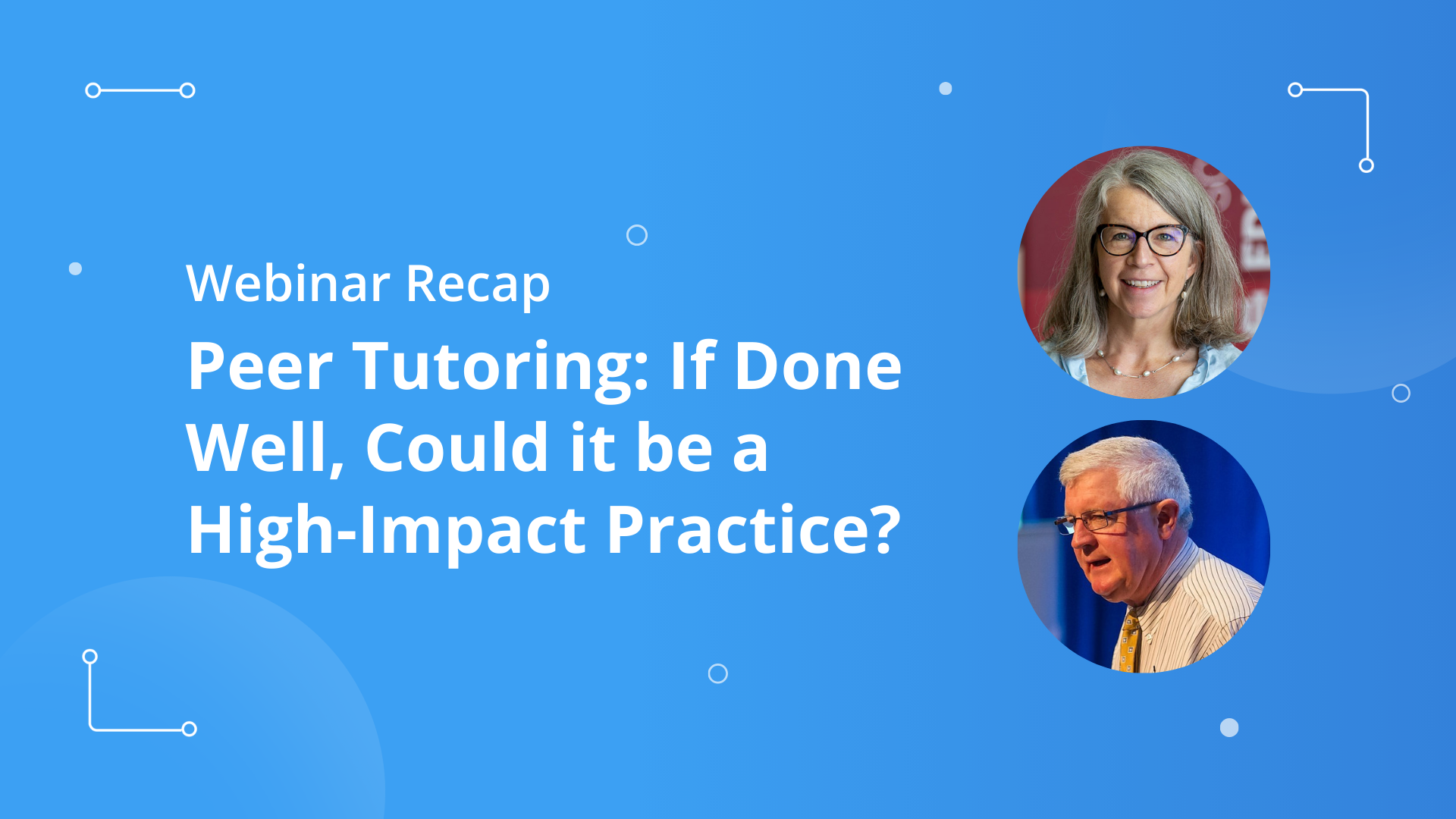Peer tutoring has long been a staple of academic support in higher education, but could it rise to the level of a high-impact practice (HIP)? In a recent virtual event, I had the privilege of exploring this question with two esteemed colleagues: Dr. Jillian Kinzie, Associate Director at Indiana University’s Center for Postsecondary Research, and Dr. George Kuh, Chancellor’s Professor Emeritus at Indiana University and one of the foremost experts on high-impact practices. Together, we explored the potential of peer tutoring to transform student engagement and success.
Why High-Impact Practices Matter
Dr. Kuh opened the conversation by reflecting on the evolution of experiential learning and its integration into higher education. He noted how practices like service learning, study abroad, and undergraduate research have earned the designation of HIPs due to their proven benefits. HIPs are distinguished by their ability to:
- Engage students deeply in learning
- Promote collaboration with peers and faculty
- Develop skills applicable to real-world challenges
- Foster a sense of belonging, particularly for students from underserved backgrounds
The question we posed was whether peer tutoring, when executed thoughtfully and systematically, could meet these criteria.
Peer Tutoring as a Transformative Experience
Research conducted through the National Survey of Student Engagement (NSSE) offers promising insights into the role of peer tutoring. Dr. Kinzie shared findings from our study involving 28 diverse institutions, which examined how students who serve as tutors or receive tutoring engage with educationally effective practices. Key takeaways included:
- For Students Who Receive Tutoring:
- 61% reported increased understanding of course material.
- 80% rated their tutoring experience as excellent or good.
- Tutored students showed significantly greater engagement with faculty and peers, stronger analytical skills, and an enhanced sense of belonging.
- For Students Who Serve as Tutors:
- Senior peer tutors demonstrated significantly higher engagement in educational practices compared to their non-tutoring peers.
- Tutors gained valuable skills in communication, problem-solving, and leadership, while also developing a clearer sense of their strengths and career goals.
Dr. Kuh emphasized that peer tutoring could shrink the "psychological size" of an institution, fostering a sense of belonging and making students feel more connected to their campus community.
The Features of a High-Impact Practice
To qualify as a HIP, an activity must meet specific criteria, including:
- High performance expectations
- Significant time and effort
- Substantive interactions with peers and faculty
- Exposure to diverse perspectives
- Frequent and constructive feedback
- Opportunities for reflection and real-world application
When examining peer tutoring against these criteria, we found both strengths and areas for improvement. While tutors reported significant benefits in skill development and meaningful interactions, gaps emerged in areas like feedback and formal training. Only 56% of tutors reported receiving training, and fewer than half said they received regular, constructive feedback—both critical components for ensuring high-quality experiences.
Lingering Questions and Opportunities
Our conversation raised several critical questions for institutions aiming to optimize peer tutoring programs:
- How can we ensure all tutors receive robust training and substantive feedback?
- How can we better promote the availability and value of tutoring services to students?
- What steps can we take to elevate peer tutoring as a recognized HIP?
Dr. Kuh closed the discussion with an essential reminder: “We can call anything a high-impact practice, but unless it’s done well, it’s not truly high impact.” For peer tutoring to join the ranks of HIPs, institutions must prioritize structured training, ongoing assessment, and mechanisms for reflection and feedback. When implemented effectively, peer tutoring holds the potential to:
- Improve academic outcomes for both tutors and tutees
- Build critical skills that translate to the workforce
- Foster a stronger sense of connection and belonging within campus communities
As we continue to explore peer tutoring’s impact, I encourage institutions to assess the quality of their programs and share their findings. Together, we can unlock the full potential of peer tutoring as a transformative, high-impact practice in higher education.
Interested in scaling high-impact experiences like peer tutoring? Schedule a meeting with Knack to explore how this approach could work for your campus.
